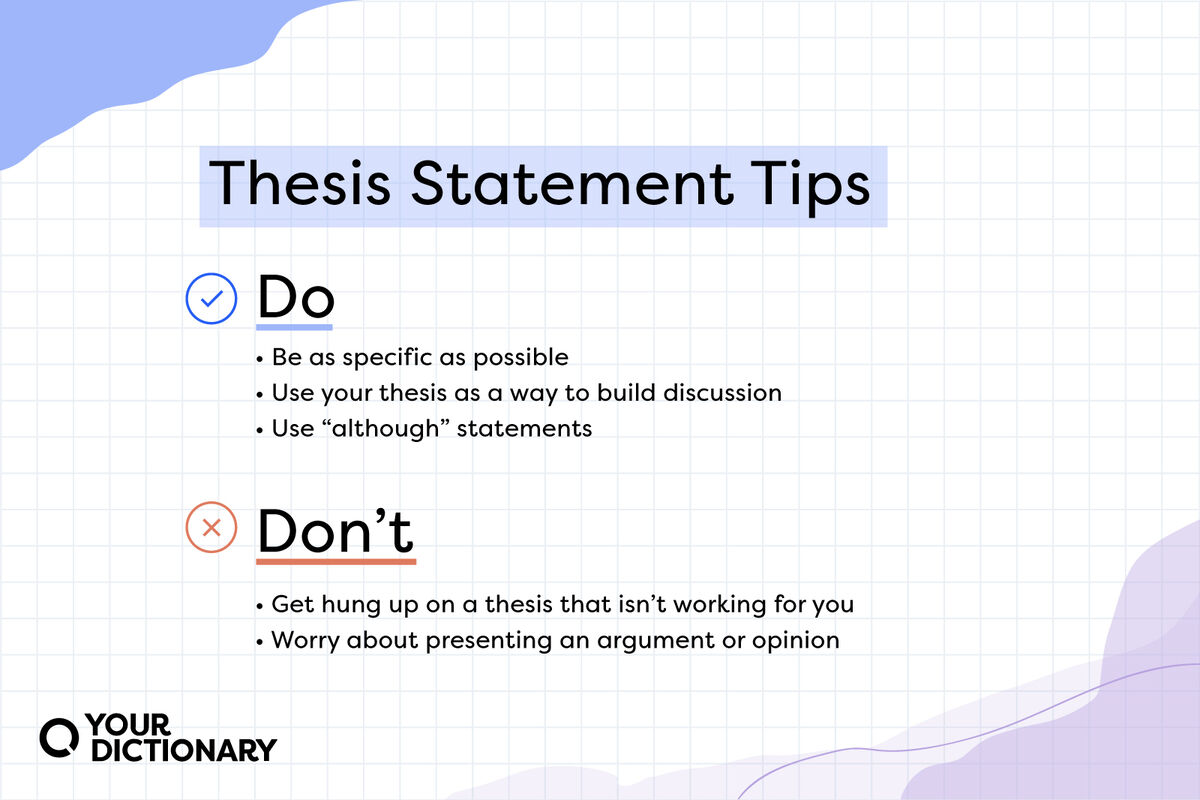
If you’ve ever summed up your feelings about your favorite croissant or reflected on the moral of a story about your grandfather, you’re already familiar with the basics of a thesis! There are some nuances, but you already have the foundations of thesis statements in mind. With a little refining, you’ll have no problems coming up with a thesis for your next essay.
What Is a Thesis Statement?
A thesis statement is a single sentence that identifies the main idea or argument of the paper, including an overview of what you’ll specifically talk about in your essay.
Every essay has a thesis of some sort that usually appears as the last sentence of the intro paragraph. The thesis is really about the main idea of the essay.
Some essays, like argumentative essays and critical analysis essays, do present a thesis that is an opinion or argument because the main idea of the essay is an argument or opinion. For example:
Although peanut butter and jelly sandwiches are one of the most commonly eaten sandwiches, they are inferior to tuna sandwiches in flavor, nutrition, and general satisfaction.
Other thesis statements are just that: statements. They make a claim, but they aren’t truly arguments. For example:
Tuna sandwiches present a long history within the American working class that has affected the broader regional cultures of the United States.
Tips on How To Write a Thesis Statement
You know what goes into a good thesis statement, but it can take a little time and practice to really figure out a good thesis. Often, the best way to get better at theses is to write more essays and maybe look at some examples of thesis statements, but looking at a few tips doesn’t hurt.
Narrow Down Your Topic, and Be As Specific as Possible
You’ll have two scenarios with your thesis: You’ll either be given a broad topic to focus on, or you’ll be allowed to choose your own topic. In both cases, you’ll have to narrow down your topic.
Don’t try to come up with some all-encompassing thesis statement that covers every single facet of the topic. That would be quite literally impossible, and frankly, trying to cover too much at once in your thesis can be boring. The more specific and direct your thesis statement, the more interesting it’ll be.
- Start with just one main idea related to the topic, and ask yourself questions about that one idea to focus in on it.
- Take a stance on the topic, even if that stance is how effective (or ineffective) something might be. Then consider why it’s effective or ineffective.
- Avoid any overly generalized words, like people, things, or society. What people or population are you talking about? What parts or facets of society do you want to focus on?
Use Your Thesis To Build a Discussion
As mentioned, most students are taught that thesis statements are meant to act as arguments. The main reason for that is the aspect of discussion. An argument naturally builds discussion. (You’re stating an opinion, making points to support that opinion, and possibly considering other points of view.)
But an argument isn’t the only way to create a thesis statement that builds discussion. That can come from a wide range of different things, like:
- Discussing your own experiences
- Suggesting a point of view that might vary from more popular views
- Considering a more critical reading of a text
Use “Although” Statements
Related to the above, one of the tricks of the trade for a good thesis that builds discussion is to work with the word although. An although statement naturally creates a point of comparison. It considers an opposing view before you get into your own claim. For example:
Although the pizza is a humble and everyday treat for many today, its history and evolution parallels many of the modern economic issues affecting Europe.
Although is by no means the only way to build this sort of thesis. Other starting words that can help you engage with the topic include:
- Because
- Since
- However
- Unless
- While
Come Up With More Than One Thesis
This might seem counterintuitive, especially if you’re having trouble writing just one thesis, but in the early stages of an essay, it’s okay to have a few messy theses to choose from.
As you settle into your research, you can eventually narrow it down to one, but having some options can free you up. You can play around with wording, refine your ideas, or even create completely opposite thesis statements.
Change Your Thesis As You Go
Related to the above, even as you get into the writing process, don’t be afraid to change your thesis. It’s not really meant to be some rigid object. Your thesis can grow and change and evolve with your writing.
Maybe in the middle of your body paragraphs you decide to change the main argument in your thesis. Maybe you forgot to mention an important point. Maybe your conclusion brings in a whole new point of insight. Allowing for a mutable thesis gives you room to make these adjustments.
Ready To Write a Winning Essay
Now that you’ve mastered the art of writing an effective thesis statement, you’re perfectly prepared to write some great essays from now on. Knowing how to write a thesis can help you in all your writing endeavors, even creative writing, but don’t worry if you’re having some trouble. Thesis statements are meant to take thought and time, so give your thesis the time it needs.